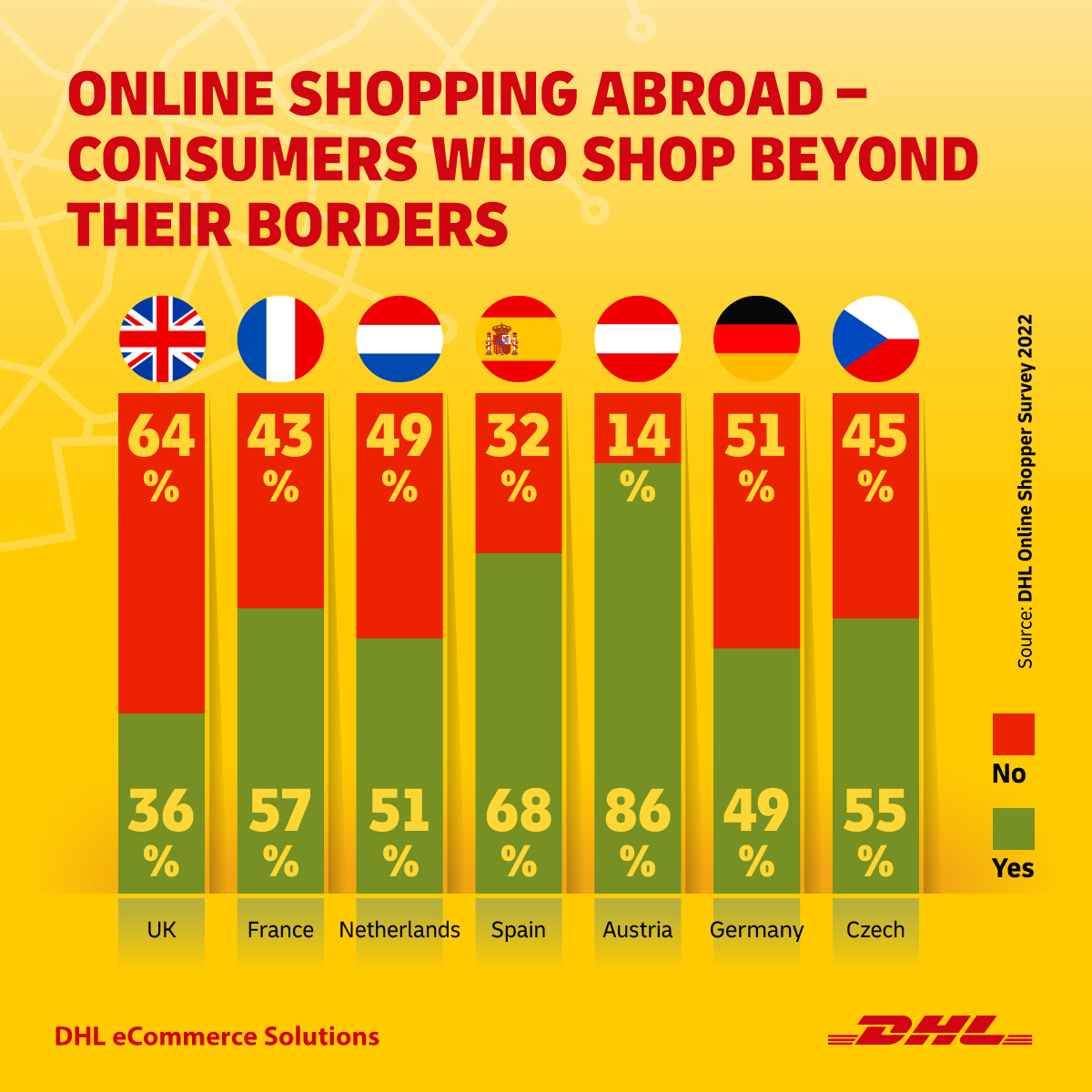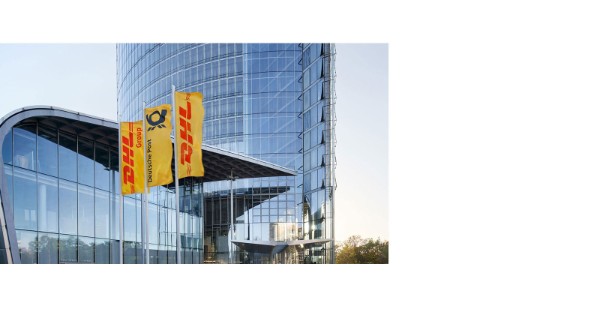Online shoppers are willing to pay more for green shipping, DHL Online Shopper Survey finds
The study provides insights into which channels Europeans prefer to shop through and how they would like to pay.
- The majority of European consumers want online retailers to become more sustainable, including delivery and packaging
- 93% of European shoppers choose online shops based on the delivery options
- Despite calls for more sustainability, customers demand free returns and regard it as a deal-breaker if not available
- As cross-border purchases increase, reliable international delivery processes become key
Bonn - For its Online Shopper Survey 2022 DHL eCommerce Solutions surveyed 5,000 online shoppers from nine countries across Europe to gain a deeper understanding of their online shopping habits. The study provides insights into which channels Europeans prefer to shop through, what is important to them in the presentation of the products and the structure of the online shop, and how they would like to pay. Delivery plays a significant role in different aspects: sustainability is becoming increasingly important for European consumers, while the reliability of the delivery provider takes center stage.
"One of the key findings of our Online Shopper Survey 2022 is, that offering a great product at a low price is no longer enough to earn a loyal customer base. Various aspects such as payment options, a trusted delivery partner and different delivery options, including green delivery, can turn a browser to a buyer. Our report provides valuable tips for online retailers who want to further expand their business and customer base," says Henning Gaudszuhn, Vice President Customer Experience at DHL eCommerce Solutions.
Online shoppers are looking to go green
Sustainability is no longer a fringe concern: 53 % of e-commerce shoppers throughout Europe want online retailers to become more sustainable, including delivery and packaging. Over a fifth of Swedish shoppers even say they would always pay more for eco-friendly deliveries. Also, 58 % of European shoppers are willing to wait longer for their delivery if it meant it was more sustainable, even if same or next day delivery was available. Accordingly, it is worth paying attention to the sustainability goals and measures of the logistics service provider when choosing one.
"By increasing the number of unattended deliveries, we can reduce up to 30 % of CO2 emissions in the last mile. Given our years of experience, we are able to strategically place Parcel Lockers and DHL ServicePoints to widely frequented places such as grocery stores and gyms," says Henning Gaudszuhn.
DHL has been pursuing its Sustainability Roadmap for several years, which envisages that DHL will be net emissions-free by 2050. The company invests in sustainable fuels on all transport routes, e-vehicles, more efficient processes in general, and sustainable operational buildings. Deutsche Post DHL Group's GoGreen Plus Service allows customers to decarbonize their shipments on all transport routes.

Shoppers expect convenient delivery and free returns
European shoppers today have high expectations regarding seamless, convenient delivery and returns experiences. Offering the right delivery options is essential to attract customers and optimize conversion rates. In fact, 93 % of European shoppers say that where they shop online is influenced by the delivery options offered at checkout. And at least 75 % of consumers in Spain, Sweden and UK say they have abandoned a shopping cart because their preferred delivery option wasn't available. In Austria, the number was even higher at 85%. The logistics service provider also plays a crucial role: 41 % of European shoppers say they won't buy at all from an online store if they aren't happy with the delivery provider offered. Gaining a trusted delivery partner helps turn interested browsers into buyers and guarantees customer satisfaction. While most want their purchases delivered directly to their homes, unattended deliveries to service stations and parcel lockers have become increasingly popular.
Return play also a crucial role. For some shoppers, having to pay for returns is a deal-breaker: around half of potential European customers would rule out buying from an e-commerce store if it didn't offer free returns. To avoid contradictions with the demands for more sustainability, an efficient and sustainable return concept is just equally important as green delivery. 81% of shoppers would prefer a returns label to be included in their parcel rather than having to print one out themselves.
Consumers want reliable and transparent delivery options, especially when shopping internationally
Over two-thirds of European consumers make at least one cross-border purchase a month. This is primarily due to specific products and brands not being available in the shopper's home country (45 %), while 33 % cite lower prices as a reason for international shopping. With consumers worrying about customs costs, difficult return policies, and extended delivery times when buying from overseas providers, they look for secure and trustworthy delivery companies which can ensure reliable logistics.
"Online shoppers would have more confidence shopping cross-border if some of their concerns were mitigated. Ultimately, a consumer should feel no difference between a domestic or cross-border parcel delivery in Europe," says Alex Schmitz-Huebsch, Vice President Global Product & Sales Management, DHL eCommerce Solutions.
Currently, Germany and the UK are the most popular countries of origin for cross-border shopping. The hurdles e-tailers face because of Brexit have made British consumers more insular, who prefer to buy locally and probably feel less connected to the European mainland. Overall, the trend is opposite to the Brexit-Effect, with 20 % of European consumers intending to increase international purchases in the coming year.
Generation gap when it comes to payment preferences
In general, the rates of online shopping have been rising steadily across Europe, with the steepest increases seen among older consumers. The proportion of Baby Boomer online shoppers in Germany has grown by 33 % since 2018 - with the COVID pandemic surely acting as a catalyst. While younger generations still do most of the online shopping, the gap between young and old is steadily closing. Major differences between young and old can be seen regarding payment preferences. Younger generations are hesitant to use credit cards and turn to 'buy now pay later' payment options to fund big purchases. However, still, the most popular payment method across all age groups remains credit or debit card. Several countries have payment quirks as in both Sweden and Germany, around 20 % of shoppers want to receive an invoice. In Poland, 29 % want to pay by bank transfer, and in the Czech Republic, nearly 20 % want the option of paying cash on delivery.
The DHL Online Shopper Survey 2022 is delivered by DHL eCommerce Solutions and provides insights into the international e-commerce industry, specific markets, and consumer preferences. DHL commissioned the study to understand European consumers' online shopping habits better. The survey took place in the first half of 2022 across nine European markets (UK, France, Spain, Germany, Sweden, Poland, Netherlands, Czech Republic and Austria) and involved 5,000 Participants who filled out an online questionnaire.
The DHL Online Shopper Survey 2022 is available for free download at
https://www.dhl.com/parcel-connect/global-en/insights/online-shopper-report-2022

Corporate Press Office
Journalists can contact the Corporate Press Office at DHL Group's headquarters here.
- DHL Group
Charles-de-Gaulle-Str. 20
53113 Bonn
Germany - Phone: +49 (0)228 182 9944
- X (twitter): @DHLglobal